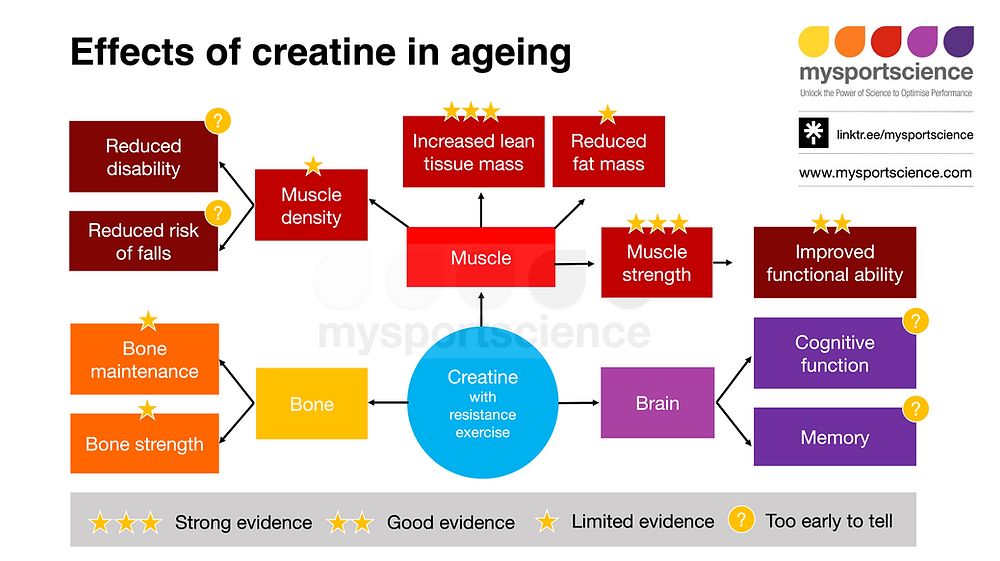As endurance athletes age, they face physiological changes that can impact performance, most notably muscle strength and mass, a condition known as sarcopenia. This phenomenon not only diminishes physical capacity but also influences metabolic efficiency and recovery, critical factors when training or competing in endurance sports. In light of these challenges, the role of creatine supplementation has gained attention, particularly regarding its potential benefits in combating the adverse effects of aging.
Creatine is an organic compound synthesized from amino acids in the liver and brain and can also be ingested through diet—predominantly from red meat and fish. While skeletal muscle stores approximately 95% of the body’s creatine, the balance is distributed in bone and the brain. The primary function of creatine is to maintain energy homeostasis, particularly during high-intensity efforts when maintaining adenosine triphosphate (ATP) levels is crucial. For endurance athletes, while short bursts of power are often not the focal point, optimizing energy availability can enhance performance in prolonged events, especially during challenging race conditions.
Research indicates that creatine supplementation, particularly when combined with resistance training, can yield benefits in muscle mass and strength for older populations. This is noteworthy since endurance athletes often emphasize the benefits of weight training for enhancing overall performance. A meta-analysis on creatine supplementation in older adults highlighted an increase in lean body mass and improvements in functional abilities, suggesting that incorporating resistance training alongside creatine may also positively affect endurance performance through enhanced muscle recruitment and efficiency during prolonged exertion.
Furthermore, muscle density has emerged as a significant factor influencing the risk of disabilities such as falls or injuries, particularly in older athletes. The interplay between muscle strength and muscle density could also extend to metabolic adaptations, influencing fuel usage during endurance events. Endurance athletes typically rely on a blend of carbohydrates and fat for energy, and maintaining an optimal muscle-to-fat ratio allows for greater metabolic efficiency. Creatine supplementation could enhance intracellular energy production, thus optimizing how quickly and effectively muscle fibers can mobilize fuel sources, ultimately supporting sustained performance.
The research regarding creatine’s effects extends beyond muscle into bone health—a crucial consideration due to the aging process. As bone mineral density often declines with age, maintaining bone strength through effective training and nutrition becomes critical for endurance athletes. Creatine appears to stimulate the metabolic activity of osteoblasts, the cells responsible for bone formation. Although most existing studies point to a lack of significant benefits from creatine alone concerning bone mineral density, those endurance athletes with a resistance training component may find an advantage in bone resilience, ultimately reducing injury risk.
Recent studies have also surfaced exploring creatine’s implications for cognitive function and mental resilience during endurance events, an often-overlooked aspect in physical performance. Research has suggested that creatine supplementation may enhance cognitive efficacy, which can be particularly beneficial during long races where mental fatigue plays a significant role in overall performance. Maintaining focus and decision-making capabilities under fatigue can be the difference between finishing strong or succumbing to performance pitfalls.
Hydration, metabolic tolerance, and recovery strategies are intertwined with the effects of creatine on performance. Proper hydration is crucial when supplementing with creatine, as the compound draws water into muscle cells, potentially leading to an increased need for fluid intake. Athletes must account for these adjustments in their hydration strategies, especially in long-duration events where electrolyte balance can be paramount. The tripartite relationship between hydration, gut tolerance, and metabolic efficiency is essential for endurance success, particularly during hot or challenging race conditions.
Competitive endurance athletes typically delve into individualized fueling strategies during their training. The timing of nutrient intake surrounding both training and racing can significantly impact performance outcomes. While traditional sources of carbohydrate remain pivotal, integrating creatine may serve to enhance recovery post-exercise. Consumption strategies could involve pairing creatine with carbohydrate intake in the post-workout window to replenish energy stores effectively, optimize muscle protein synthesis, and expedite recovery.
Endurance athletes often face unique challenges during long training sessions or races, with gut tolerance becoming a crucial aspect of their nutrition plans. Supplemental strategies must consider individual variability in gastrointestinal response, and incorporating creatine during endurance training regimes should be approached cautiously. Careful testing of doses and timing is vital to ensure that athletes discover what works best for their systems without incurring gastrointestinal distress.
In summary, while creatine supplementation offers promising advantages for older athletes in combatting the age-related decline in muscle mass and strength, its implications stretch beyond physicality into cognitive function and recovery optimization. For endurance athletes, balancing supplementation with resistive training can enhance overall performance, stabilize metabolism during prolonged exertion, and allow for effective recovery strategies. A realistic takeaway for athletes would be to experiment with creatine supplementation alongside their regular training regimen. This could be tailored to moments when muscle recovery is a priority, particularly after demanding sessions, thereby supporting enhanced performance in long-duration events.
